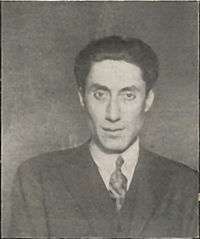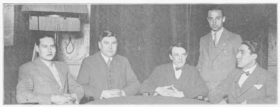Edmond Soussa

Edmond Soussa (born 11 October 1898 in Cairo; died 29 May 1989 in Paris) was an Egyptian carom billiards player in various disciplines and 11-time world champion.
Career

Edmond Soussa was the first major amateur billiards star of the late 1920s and mid-30s after the end of the professional world championships in the United States of America. Born in Egypt, he immigrated in the mid-1920s to France. There he met Roger Conti, one of the best billiards coaches at that time. He quickly proved his great talent as an all-rounder. At the 1927 Balkline 47.1 World Championship in Paris he finished third place. The following year he won three-time world championship titles in the disciplines three-cushion billiards, straight rail and balkline 47.1. He dominated the carom scene during the upcoming years and has won a total of eleven world and two European titles. [1]
In the mid 1930s, he withdrew from active billiards play and worked as a freelance artist in Paris.[1] With the beginning of the Three-Cushion World Cup in 1986, he returned to the big carom stage. Werner Bayer, founder of the World Cup convinced him to design a trophy for this tournament series. He attended various three-cushion World Cups in his old age.[2]
Achievements
Soussa was an eleven-time world and two-time European champion.[3]
- Winner: 1928, 1929
- Runner-up: 1930, 1931, 1933
- Third place: 1936
- UMB World Straight-Rail Championship
- Winner: 1928, 1929, 1930
- Runner-up: 1931, 1932
- UMB World Balkline 47.1 Championship
- Winner: 1928, 1929, 1931
- Runner-up: 1930, 1932, 1933
- UMB World Balkline 47.2 Championship
- Winner: 1933
- Runner-up: 1930
- Third place: 1927, 1928, 1929, 1932
- UMB World Balkline 71.2 Championship
- Winner: 1930, 1931
- CEB European Balkline 47.2 Championship
- Winner: 1932, 1933
- Third place: 1928, 1929
References
| Wikimedia Commons has media related to Edmond Soussa. |
- 1 2 Weingartner, Heinrich (1989). "Billard Magazine (Austria)". Vienna: Weingartner: 8.
- ↑ Bayer, Werner (2004). "The Blue Square - Fascination Billiards". Dr. Werner Bayer-Foundation: 40, 268.
- ↑ "Edmond Soussa". Kozoom. Retrieved 11 November 2015.
